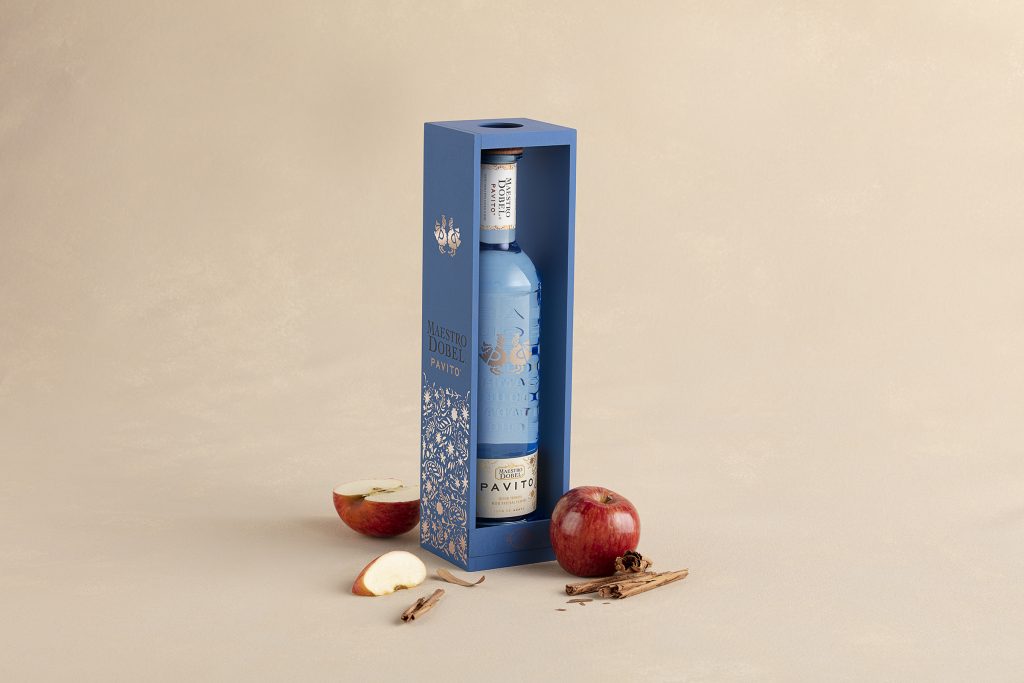Maestro Dobel’s New Pavito Expression Is The World’s First “Pechuga” Tequila
Made through ancestral mezcal production methods, this spirit is purpose built for special occasions

When Maestro Dobel began experimenting with ancestral mezcal production techniques in pursuit of its next tequila expression, Alex Coronado (maestro tequilero and head of production) and his team knew they would have to strike a delicate balance. Tinkering with long-established formulas and cherished—some might say sacred—products always carries some degree of risk. “From the beginning it was about, ‘How can we innovate while also going back and respecting the tradition?'” he tells us.

With Pavito (the name means “little turkey” in Spanish), Maestro Dobel has created what it’s positioning as the world’s first “pechuga” tequila, crafted through methods traditional when making mezcal but virtually unheard of in tequila production. The process involves putting the spirit through a maceration with various fruits and spices prior to a final distillation in which a protein—typically a turkey breast—is hung inside the still as the spirit vaporizes and condenses. As the turkey breast cooks inside the still, it imparts a touch of umami to the liquid as it distills while also (somewhat counter-intuitively) dialing up some of the lighter, brighter fruit and citrus notes in the distillate.

In the world of artisanal mezcal, pechuga is all about celebration. By macerating a twice-distilled agave spirit in a carefully selected mix of fruits, herbs, spices, grains and/or nuts, and then distilling it a third time with a turkey breast or other protein suspended in the still, the final product is essentially infused with an opulent feast. Within the vast universe of mezcal, pechuga holds a special place, representing a kind of offering and tribute to each season’s agricultural bounty. While it’s now bottled and sold alongside other agave spirits, traditionally pechuga plays the role of special occasion liquid—poured to for holidays, weddings and births or to toast to deceased loved ones.

Applying this kind of traditional mezcal process to tequila (which, though a subcategory of mezcal, has its own distinct set of traditions and production methods) could prove controversial among mezcal and tequila purists. But the team at Maestro Dobel knows about pursuing innovation while maintaining the integrity of a legacy product.
A decade ago, the Jalisco-based distiller played a role in pioneering and popularizing cristalino, an entirely new category of premium tequila made by filtering aged tequilas through activated charcoal to strip out color and certain undesirable wood flavors. The new product accentuated the more desirable aspects of barrel aging while preserving the agave spirit’s bright, fruity crispness, but there was no guarantee consumers would embrace this kind of technological intervention. Today, cristalino makes up the fastest growing segment within a booming tequila industry, with dozens of brands chasing early movers like Don Julio and Maestro Dobel into the space.

Pavito isn’t necessarily poised to spawn its own segment within the tequila category, but it may make the notion of pechuga more palatable to a wider group of drinkers. Coronado and his team spent more than two years tinkering with the recipe for their pechuga maceration, which includes pineapple, mango, bananas, apples and sugarcane, along with various spices including cinnamon and tejocote—a fruit native to Mexico. That final ingredient is an unmistakable nod to one of Coronado and company’s inspirations when designing their flavor profile. “There’s a drink in Mexico in the Christmas season called ponche,” he says. “When you’re a kid, that’s what you drink. It has a lot of fruit, a lot of spices and it reminds Mexicans of end-of-year celebrations.”
For Pavito, Coronado combines those fruit and spice components with a finished batch of Maestro Dobel silver tequila for a roughly two-week maceration before straining the liquid and returning it to a copper pot still. It then undergoes the traditional, third distillation with the aforementioned turkey breast. “The turkey gives you just a slight note of savory,” Coronado says, but not enough to overshadow the underlying tequila’s core agave notes or those provided by the macerated fruits.

The final product is indeed dialed in tightly on flavors of agave, tropical fruit and spice. The nose is bright and full of citrus, pineapple, mint and anise. But the celebration really begins on the palate, where a solid core of cooked agave is strewn with tropical and citrus fruits, cinnamon, anise, peppermint, tejocote and sugarcane. Despite possessing that slight savory element, overall Pavito is lively, bright, energetic and festive. It performs, in other words, exactly as designed.
Images courtesy of Maestro Dobel












